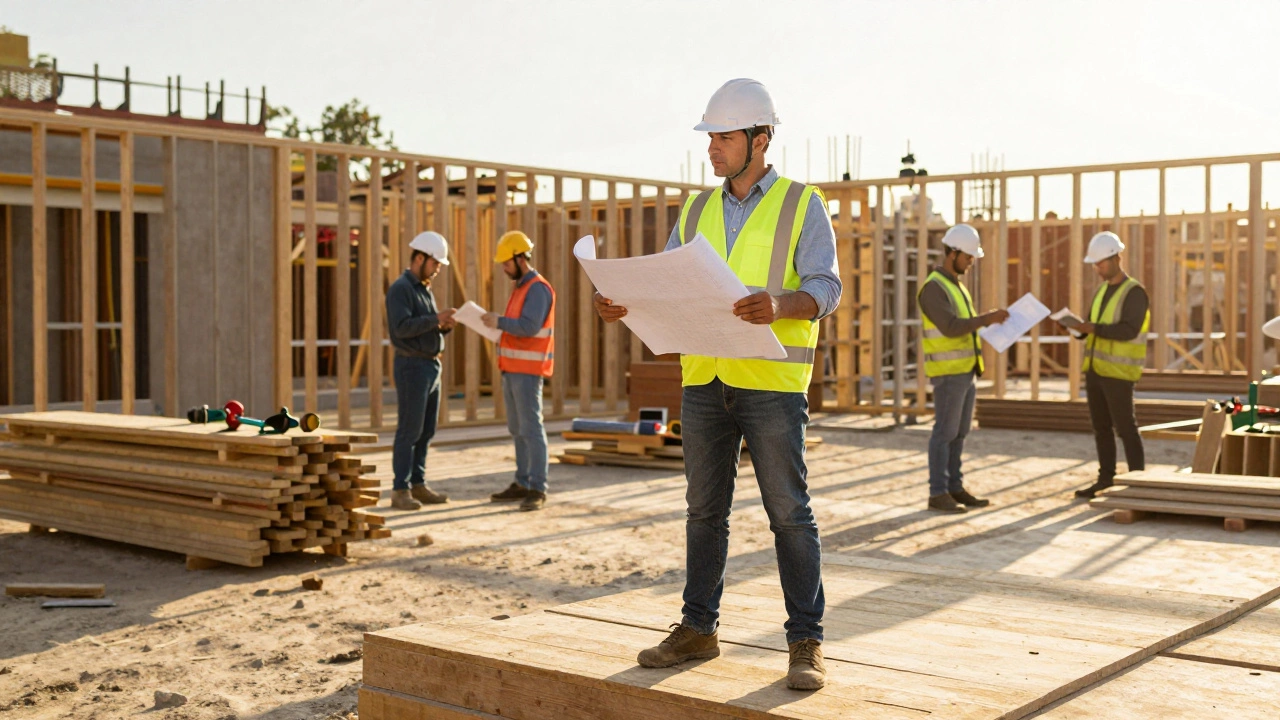So, picture this: you're dreaming of expanding your kitchen or maybe you just want to build that perfect deck. But wait, who makes that happen? That’s where a building contractor steps in. Think of them as the project manager who turns your Pinterest board into a reality.
They don't just call the shots; they're the glue holding the entire construction process together. They're coordinating with architects, talking to suppliers, and making sure everything comes in on time and within budget. It’s like they're conducting this crazy orchestra with lots of moving parts, only it's a symphony of bricks, beams, and a whole truckload of materials.
If you ever come across someone who seems to have a magic touch in making things happen, that’s them. But let’s break it down a bit further to see what's under the hood of their day-to-day life and why they're so vital in construction projects.
- Defining a Building Contractor
- The Role in Construction Projects
- Skills of a Successful Contractor
- Common Myths About Contractors
- Choosing the Right Contractor for Your Project
- The Future of Building Contracting
Defining a Building Contractor
So, what's a building contractor anyway? At its core, this role is all about managing construction projects from start to finish. Think of them as the director of a movie, where the movie is your new home or renovation project. They make sure everything goes according to the script—er, plan.
These folks are like Swiss Army knives in the world of construction. They're not just handling one thing; they're juggling a crazy number of tasks all at once. This includes hiring subcontractors, managing permits, ordering supplies, and keeping everyone on track. Basically, they're the ones making sure the scaffolding doesn't fall apart and the plumbing’s where it’s supposed to be.
A good contractor combines technical skills with managerial expertise. They've got to understand architectural plans, be in touch with the latest construction technology, and have a knack for leadership. They've got to wear many hats and do it all with a smile.
One of the big questions—how are they different from other construction players? Well, unlike architects who design or craftsmen who build parts of the project, building contractors oversee every bit of the project. They're generalists with a deep understanding of all things construction, making sure each puzzle piece fits perfectly.
Interestingly enough, in a survey done last year, about 75% of homeowners said they relied heavily on a contractor to manage their home projects, rather than doing it themselves. Why? Because diving into construction without a pro is a bit like going on a road trip without a map—it can get messy quickly.
The Role in Construction Projects
So, what exactly does a building contractor do in the chaos of a construction site? They are pretty much the backbone of the operation. Imagine them as the captain of a ship. They might not lay every brick themselves, but they guide the team to ensure everything runs smoothly.
One of their major responsibilities is coordination. They're like experts at a juggling act—dealing with scheduling, resource allocation, and making sure there aren't any hitches. A contractor's phone is always buzzing as they're constantly communicating with architects, clients, and a whole crew of workers. They make sure everyone’s on the same page, which is super crucial.
As per the Associated General Contractors of America, "A contractor is a liaison between the vision of the architect and the physical realization of the plans."
If there’s an issue with the project, they're on it, ensuring minimal disruption.That means troubleshooting problems, keeping up with regulations, and finding solutions when something goes sideways.
Money is another biggie. They don't just spend; they track expenses meticulously to ensure everything fits within the budget. Whether it’s negotiating with suppliers or finding cost-effective solutions for unforeseen issues, they're the fiscal wizard in charge.
Need some numbers to back this up? Check this out:
| Aspect | Percentage of Time Spent |
|---|---|
| Project Management | 30% |
| Communication and Coordination | 25% |
| Budgeting and Finance | 20% |
| Problem Solving | 15% |
| Compliance and Regulations | 10% |
So, there you have it. A building contractor isn't just a bossy foreman—they're a strategic manager ensuring that the construction symphony hits all the right notes unswervingly. And without them, let's be honest, that dream house might just remain a figment of your imagination.
Skills of a Successful Contractor
Being a building contractor isn't just about knowing how to swing a hammer. It's a mix of different skills that go beyond the physical part of construction. Here’s what makes a contractor truly stand out and ensures your project runs like a well-oiled machine.
First up, any contractor worth their salt needs to have serious construction management skills. They have to juggle timelines, budgets, and a team of varied specialists. This means keeping everything and everyone on track without losing their cool, even when unforeseen issues pop up.
Communication is another big one. Contractors need to communicate clearly with everyone, from clients and architects to the crew on site. It's like being the translator between different languages in the construction world. Miscommunication can lead to delays and cost overruns, which nobody wants.
Next, let's talk problem-solving. Imagine a sudden rainstorm derailing your work schedule or a shipment delay leaving you short on materials. A successful contractor can think on their feet and come up with Plan B (or C, or D) without missing a beat. Their ability to adapt quickly and effectively keeps the project going strong.
Being detail-oriented is crucial, too. Whether it’s double-checking measurements or ensuring safety standards are met, a sharp eye for detail prevents mistakes from becoming disasters down the line.
Lastly, having a good grasp of the latest technology and construction techniques gives a contractor an edge. Staying up-to-date with industry trends means they can offer innovative solutions, potentially saving time and money while enhancing the quality of the build.
Wrap these skills together and you’ve got a contractor who’s ready to tackle any construction challenge, ensuring your project not only gets completed on time and within budget but also meets your vision down to the last detail.

Common Myths About Contractors
Let's clear the air about building contractors. There’s a lot of confusion out there, and these myths just refuse to die. Ever heard someone say all contractors are out to empty your wallet? That’s like saying every car dealership is out to sell you a lemon.
One big myth is that building contractors only care about the money. While it’s true that budgets matter, most contractors are genuinely passionate about what they do. They want to build something you love as much as you do. Their reputation depends on happy clients, so it’s in their best interest to keep things above board.
Another common misconception is that contractors don’t really do much; they just hire the workers. In reality, they're involved in every decision, making sure the project follows the plan, meets code requirements, and stays on schedule. Think of them like the director of a movie – without their vision and leadership, the whole thing can fall apart.
Then there’s the myth about permits and inspections. Some folks think contractors bypass regulations to speed things up, but that’s a fast track to disaster. A good contractor ensures every “i” is dotted and “t” is crossed, because failing inspections can lead to costly delays or even having to tear things down and start over.
If you’ve ever thought that contractors aren’t tech-savvy, think again. Modern construction management is packed with technology, from using drones for site surveys to software that tracks progress. The tools in their arsenal are cutting-edge, not just a hammer and a hard hat.
| Myth | Reality |
|---|---|
| Only about money | Focused on quality and client satisfaction |
| Minimal involvement | Highly involved in all project phases |
| No need for permits | Strict adherence to laws and regulations |
| Avoid technology | Utilizes modern tech for efficiency |
So next time you hear these myths, remember, many are just stories without much truth to them. Trust in professional contractors who have proven their skills through solid projects and happy customers.
Choosing the Right Contractor for Your Project
Finding the right building contractor is like picking a partner for a dance; you need someone who moves in sync with your vision. It starts with doing your homework. Check their licenses and insurance to ensure they're legit. It's not just about skill; it’s about protecting your investment.
First, ask around. Word of mouth is powerful. Your neighbors, friends, or even local community boards can offer real experiences that no flashy ad can.
Once you have some names, dive deeper by checking out online reviews and their construction management track record. Look for completed projects similar to yours. That gives you a sense of how they handle projects like yours.
It's super important to meet potential contractors face-to-face. Think of it like an interview. Ask about their previous projects, how they manage deadlines (trust me, that's vital), and who their go-to subcontractors are. You don’t want unexpected strangers showing up to the party.
- References Matter: Always ask for references and follow up. Hearing about past successes or hiccups from previous clients can be a game-changer.
- Get Multiple Bids: Don't just stop at one estimate. Have at least three different contractors give you a bid. This helps you figure out what's reasonable for your project and avoids getting ripped off.
- Written Contract: Once you settle on someone, ensure everything’s in writing. From timelines and costs to even the tiniest details like cleanup, get it documented.
Here’s a wild fact: About 35% of issues with contractors arise from lack of communication. So, ensure they’re someone who keeps the lines open. Clarity is not just helpful; it’s crucial.
| Factor | Importance |
|---|---|
| Licenses and Insurance | Essential for legal and financial protection |
| References | Reveals reliability and quality of work |
| Written Contract | Prevents misunderstandings and legally binds agreements |
In the end, picking the right contractor is about balancing qualifications with a good gut feeling. You want someone who’s not just technically capable but also someone you genuinely feel comfortable working with. Because they're not just building a thing...they're helping build your dreams.
The Future of Building Contracting
Ever seen a construction site and wondered how it might look in just a few years? The world of building contracting is getting a massive upgrade. With new tech like drones, 3D printing, and digital project management tools, building contractors are about to experience a blend of futuristic gadgets and old-school know-how.
One thing that's changing fast is how contractors manage projects. Gone are the days of endless paperwork and phone tag. Digital tools are here, and they mean business. Imagine managing your construction site with just a tablet. Contractors now use software that allows them to track progress, manage finances, and communicate with teams, all in real-time.
And let’s not forget about technology like drones. They’re doing site surveys quicker and safer than ever before, giving contractors detailed topographical maps. Plus, these drones help with ongoing inspections—spotting issues before they turn into big problems.
Another cool development? 3D printing. It sounds like science fiction, but it’s real. Contractors can now create entire structures or parts of them using 3D printing techniques. This reduces waste and shortens construction timelines dramatically.
| Technology | Impact on Contracting |
|---|---|
| Drones | Improved site surveys and inspections |
| 3D Printing | Faster construction, less waste |
| Digital Project Management | Better communication and efficiency |
But it’s not just about new tech toys—it's about a shift in mentality too. Today’s contractors are more focused on sustainability. They're looking at eco-friendly materials and energy-efficient designs. This approach not only saves money in the long run but also appeals to more environmentally-conscious clients.
In short, the future of building contracting looks bright and tech-driven. Whether you're considering becoming a contractor or planning your next big project, keeping an eye on these changes can give you a head start. It’s an exciting time to be in the construction world, don't you think?






